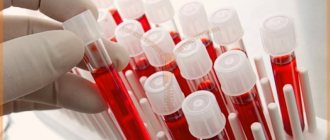Preparing for the study
When donating blood for glucose (in addition to the basic requirements for preparing for tests), you should not brush your teeth, chew gum, or drink tea/coffee (even unsweetened).
A morning cup of coffee will dramatically change your glucose levels. Contraceptives, diuretics and other medications also have an effect. GENERAL RULES FOR PREPARATION FOR RESEARCH:
1. For most studies, it is recommended to donate blood in the morning, from 8 to 11 o’clock, on an empty stomach (at least 8 hours must pass between the last meal and blood collection, you can drink water as usual), on the eve of the study, a light dinner with a restriction eating fatty foods. For tests for infections and emergency studies, it is acceptable to donate blood 4-6 hours after the last meal.
2. ATTENTION! Special preparation rules for a number of tests: strictly on an empty stomach, after a 12-14 hour fast, you should donate blood for gastrin-17, lipid profile (total cholesterol, HDL cholesterol, LDL cholesterol, VLDL cholesterol, triglycerides, lipoprotein (a), apolipo-protene A1, apolipoprotein B); The glucose tolerance test is performed in the morning on an empty stomach after 12-16 hours of fasting.
3. On the eve of the study (within 24 hours), avoid alcohol, intense physical activity, and taking medications (in consultation with your doctor).
4. 1-2 hours before donating blood, refrain from smoking, do not drink juice, tea, coffee, you can drink still water. Avoid physical stress (running, quickly climbing stairs), emotional excitement. It is recommended to rest and calm down 15 minutes before donating blood.
5. You should not donate blood for laboratory testing immediately after physiotherapeutic procedures, instrumental examination, X-ray and ultrasound examinations, massage and other medical procedures.
6. When monitoring laboratory parameters over time, it is recommended to conduct repeated tests under the same conditions - in the same laboratory, donate blood at the same time of day, etc.
7. Blood for research must be donated before starting to take medications or no earlier than 10–14 days after they are discontinued. To assess the control of the effectiveness of treatment with any drugs, a study should be conducted 7-14 days after the last dose of the drug.
If you are taking medications, be sure to notify your doctor.
The fear of getting some kind of incurable disease is familiar to many, but in some cases it becomes exaggerated and sometimes absurd.
Today, many people live in fear of contracting HIV infection, and, as a result, AIDS. However, fears are not always justified, especially taking into account compliance with all generally accepted rules and safety measures.
In fact, the likelihood of contracting this viral disease is greatly exaggerated, given the rather limited routes of transmission. During sexual intercourse, a condom should be used until the very end of the act. When using intravenous medications, use only your own clean syringes, needles and filters, dosing cups, and other supplies. When applying tattoos and visiting beauty salons, you need to take care of the sterility of the procedure.
In the case when the fear of getting sick becomes obsessive and strong, it is defined as a phobia, that is, a mental state that a person can hardly control.
A person exhibits so-called AIDS phobia. This panicky fear of being sick with AIDS goes into the category of human mental disorders. AIDSphobia begins to manifest itself in:
- Constant obsessive thoughts about situations of infection, symptoms (which suddenly appear in oneself);
- A stable desire to take screening tests and unreasonable doubts about their unreliability;
- A craving for constant study of medical literature and Internet resources on the topic of the disease;
- Endless conversations with others on this topic
A person with any phobia feels unhappy - he simultaneously feels sick or in danger, and alone. It seems to him that those around him do not want and cannot understand him. Due to distress, his immune system objectively begins to suffer.
To answer the question of whether this condition is a mental illness, you need to consult a psychiatrist. After a professional study, a specialist will be able to determine what is happening to the person: a reaction to a trigger, an obsessive state or a deeper personality disorder - AIDS phobia.
AIDS phobes have so firmly ingrained in their heads the idea of the fear of getting sick that they begin to see the danger of contracting AIDS everywhere: a red spot on the ground, pens in public places, a toilet seat, benches in the park. Currently, the true reasons why certain people develop AIDS phobia, while others under the same conditions do not, remain unknown. Some mental health experts believe the cause may be genetic. Others are inclined to believe that the cause of fears may be some traumatic events in life. For example, a fear of water may be caused by having nearly drowned or having seen someone drown. In the same way, the fear of contracting the human immunodeficiency virus can be caused by knowledge of the consequences of HIV infection - the development of AIDS.
Currently, photos and descriptions of AIDS patients are in the public domain, people read, watch, and some of them develop a fear of getting AIDS. AIDSphobia is further intensified by the fact that in most cases the cause of HIV infection is a conscious immoral action: unprotected sexual contact with a call girl, same-sex contact, joint use of psychoactive substances, for example, spice, which cause sexual disinhibition and ultimately lead to HIV infection . The feeling of guilt that a person experiences strengthens the phobia. Usually, in the minds of an AIDS phobe, HIV is an inevitable punishment for his “adventures.” The stigmatization of HIV (the belief that AIDS affects only people leading a dissolute, immoral lifestyle) strengthens the phobia.
Also, AIDSphobia can also be significantly enhanced by such a condition as pseudoAIDS - there are signs similar to AIDS (weight loss, night sweats, fever, headaches, “Kaposi’s sarcoma” rashes, painful, enlarged lymph nodes), but in reality there is no HIV in the person’s body. He does tests without stopping, but this does not satisfy him and the cycle repeats again and again, to the point that the body is forced to put the brain into the mode of the so-called pink reality (madness) so that the body does not destroy itself. The existing system of medical care itself often acts as a factor contributing to the development of AIDS phobia in the patient.
In connection with all of the above, we recommend following simple safety rules and taking an HIV test at least once a year. If symptoms of AIDS phobia appear, you should consult a specialist.
Why you need to stop being afraid to donate blood
More than half of Russians (63%) are not ready to become donors Photo: Anna Mayorova © URA.RU
Donors are honored on June 14 - the World Health Organization (WHO) created this holiday to encourage people to be more active in donating blood, prolonging and saving lives. But not everyone will dare to undergo the procedure - many are afraid of fainting from the sight of their own blood, harming their health, or becoming infected with something from the needles. Together with the head of the blood transfusion department of the Moscow Center named after. Bakulev Alexey Kupryashov debunks the main myths about donation in the material URA.RU.
More than half of Russians (63%) are not ready to become donors, according to a survey by VTsIOM. Basically, these are people who cannot donate blood due to health reasons or age. But there is also a large proportion of those who find other reasons.
“Donation is harmful to health, and after the procedure everyone faints”
Our body is ready for small blood losses, and the volume of blood that the donor gives does not exceed acceptable physiological limits. On average, 4 liters of blood circulate in the body of an adult, and if you periodically give 500 ml - approximately 12% of the total volume, nothing terrible will happen. It’s another matter if a person has a body weight of less than 50 kg or diseases of the blood, hematopoietic organs, or low hemoglobin. In this case, he simply will not be allowed to donate.
Losing 500 ml of blood is most often painless for the body
Photo: Anna Mayorova © URA.RU
If you are healthy and donate blood, you may actually faint after the procedure. “Fainting is a complication of donation, which is associated with the regulation of vascular tone. We are ready for this, we quickly remove donors from these states. And I must say that even those who survived them later return to us again,” shares Kupryashov. Fainting occurs due to an imbalance in the water balance in the donor's body. But it is quite possible to avoid them - you need to drink a lot before and after donation. Before the procedure itself, you should have a good breakfast.
“By donating blood, you can get an infection or virus”
At the blood transfusion station, safety is taken very seriously - disposable sterile equipment is used, and doctors open all needles and syringes in front of the donor. “The risk of infection is completely eliminated. We work only with disposable systems - one donor, one system. They are factory-made and properly sterilized, so infection with anything is impossible,” assures Kupryashov
Infection is also impossible because nothing is injected into the donor’s blood - doctors only take the required amount of blood, carefully treating the venipuncture site. The donor itself is also a priori safe for recipients - only those who have passed tests for hepatitis, HIV and tuberculosis with negative results are allowed to undergo the procedure.
“Donating blood is painful, long and tiring”
Most often, the procedure is limited to the unpleasant sensations of having a needle inserted into a vein. They are familiar to everyone who has at least once donated blood from a vein for testing or has been on a drip. But then the blood calmly enters the system, without causing discomfort to the donor.
The standard blood donation procedure takes no more than 20 minutes
Photo: Anna Mayorova © URA.RU
“The timing of donation depends on its type. If we take the blood completely, it takes no more than 15-20 minutes. If it is plasma, then about 30-40 minutes. If we are talking about the preparation of cellular elements - platelets, for example, this can take up to two hours,” says Kupryashov. Most often, the whole blood is donated, so it won’t take much time.
If you have prepared correctly, then afterward you will definitely not feel tired or lack of strength. “I haven’t noticed any weakness in donors; if everything goes away without fainting, they, on the contrary, often note a surge of strength and vigor,” the doctor emphasizes.
“Fresh donor blood is not so needed. Moreover, there are various substitutes"
Today in the world there are no substitutes for red blood cells (the main blood cells that carry oxygen and color it red - editor's note) that could be used in the clinic. There are also no platelet substitutes. Therefore, the demand for donated blood in hospitals remains high. “The need for blood remains both for physical use and for the production of drugs and components,” notes Kupryashov.
If we talk about blood plasma, people have really learned to produce concentrates and drugs that can partially replace it. But to obtain these substances, you still cannot do without real plasma. Now the donation of this substance is especially relevant, because it has begun to be used to treat coronavirus. Patients with antibodies to the infection can share immunity with those at risk of developing a severe form of the disease.
In 2021, blood was donated more than 2.8 million times in Russia, and its total volume exceeded 735 thousand liters. But even this scale is not enough to help everyone - the need for blood is always high.
If you look at the “Donor traffic light” of the Russian blood service, you can see that in Moscow alone, dozens of hospitals glow red. This means they are critically short of donor blood.
“By donating blood regularly, you can gain weight. Or lose your natural complexion"
Contrary to popular misconceptions, donors do not gain weight at all after donating blood, and their complexion does not change. The only change in appearance that may occur is the appearance of a characteristic scar at the site of blood sampling. But not everyone faces this problem, notes Kupryashov.
“This only happens with very frequent blood donations. This is a kind of distinctive sign of honorary donors. Usually doctors prick in the same place, where the vein is thicker, since the needles used are quite thick. And if a person donates blood often, then after the 50th or 60th time a scar appears on the skin, like with constant cuts,” says the doctor
“If I still decide to donate blood, then it’s worth eating properly. For example, eat more high-calorie foods."
A good breakfast before the procedure is the key to ensuring that the blood donation goes without complications. However, doctors do not recommend eating high-calorie, fatty foods on the eve of donation and immediately before it. According to Kupryashov, fats enter the blood, causing its quality to deteriorate, which means it becomes more difficult to prepare and store.
Before the procedure, you should have a good breakfast, avoiding high-calorie foods and dishes.
Photo: Anna Mayorova © URA.RU
The second dietary restriction is bananas. They are very rich in potassium, of which there is already enough in donor blood, so they should also be abandoned. But there are no problems with carbohydrates - before the procedure you can eat sweet cereals with water, chocolate, cookies in your usual doses.
There are other important tips: 72 hours before the procedure you should stop taking medications (aspirin- and analgesic-containing drugs), you should forget about alcohol 48 hours before. And one hour before donating blood, you should not smoke.
You can find out where you can become a donor in your city on the Blood Service website.
Current news from Russia and the Urals - in the telegram channel "URA.RU" and delivered to your mail - an overview of the most important messages.
Description of the phobia
This reaction to tests is caused by hemophobia, or fear at the sight of blood. People with this disease are seized with fear just at the thought of having to visit hospitals, not to mention the fact that they will have to donate blood from a finger, and even more so from a vein.
Hemophobes often turn to traditional medicine or ignore their diseases, thereby incurring a greater likelihood of irreparable consequences.
The situation becomes especially complicated if a child is afraid of blood, which is also not a rare occurrence. This type of phobia does not have deep roots, which means you have a chance to overcome it on your own. Fear of taking tests can also be caused by other factors, such as fear of the hospital, doctors, or sharp objects. It is necessary to first eliminate the primary phobia, and then its consequences.
Cause of fear
The hospital environment, with its strange smells and many people in white coats, unnerves even adults, not to mention a child. And if you can control yourself, knowing that nothing bad will happen, then the baby is often frightened by the unknown.
The strictness of parents and doctors only aggravates the situation. The first bad experience perpetuates the negative reaction, and the child is afraid to donate blood for many years to come. In addition, the hysterical behavior of other children and the angry reactions of their mothers and fathers have the strongest influence; the baby begins to be afraid and cry, succumbing to general panic.
A more rare cause of fear is the inability to tolerate pain of any intensity, resulting from improper parental behavior or excessive care. If the baby is old enough, you should try to talk to him. Having found out what moment scares him the most, try to reassure your son or daughter and explain what is happening and why it is necessary.
Another common reason is that the child is afraid of blood (its very form). The reasons for this may lie on the surface - the baby is frightened by the very unnaturalness of the process - or much deeper. For example, a phobia may be associated with the fear of death. In such cases, the child usually asks to quickly cover the wound with a plaster or bandage, arguing that all the blood may leak out.
What to do if a child is afraid to donate blood?
Be sure to explain what the procedure is. Omit the naturalistic details; speak in general terms in a calm, confident tone. This will help the child calm down. While in line at the clinic, keep him busy with something interesting:
- talk about joyful family plans: trips, holidays, meetings;
- read an interesting fairy tale;
- play with your favorite toy.
Do not deceive your child with stories that the procedure is absolutely painless. Once he realizes that this is not true, he will lose trust in you. During the blood draw, be nearby and, if possible, hold your son or daughter's hand. Don't show your excitement.
If a child is afraid to donate blood from a vein, and this procedure is unpleasant even for adults, invite him to close his eyes and focus on the sensations. This will make you aware of the pain, thereby reducing it.
If your child is already frightened by past unpleasant experiences, try visiting a private clinic. The approach there is gentler, and signing up for a specific time will allow you to avoid queues and tedious waiting.











